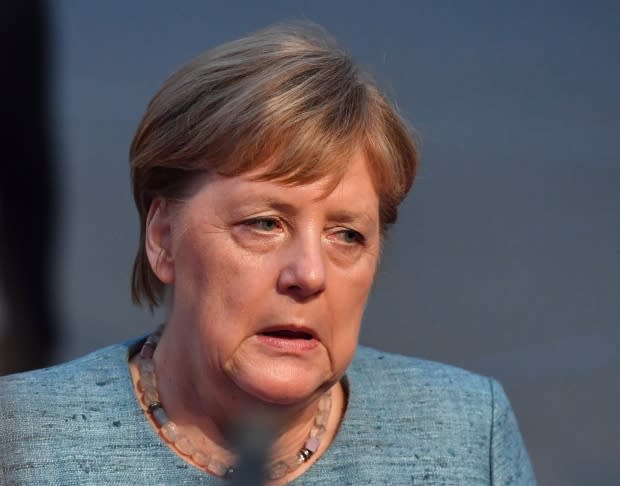Britain pleads with EU leaders to drop 'unacceptable' Brexit demands
British Prime Minister Theresa May appealed directly to fellow European leaders on Wednesday to drop the "unacceptable" Brexit demands she said could rip Britain apart, and urged the bloc to respond in kind to her "serious and workable" plan.
After Wiener schnitzel and four hours of discussions over Europe's migrant problem, May was given the floor and tried to win over her EU counterparts by effectively asking them what they would do if they were asked to agree a "legal separation" of their countries — something she says the EU is asking for by insisting Northern Ireland might stay under EU economic rules.
"I believe that I have put forward serious and workable proposals. We will of course not agree on every detail, but I hope that you will respond in kind," May told the other leaders attending the summit.
They listened politely for a few minutes but said afterwards that a stalemate on the Irish border was unbroken.
In order to maintain a united front, the 27 other EU heads of government will discuss May's proposals among themselves over lunch on Thursday, setting what chief EU negotiator Michel Barnier hopes can be a path to a final deal in two months.
For now, however, there seemed to be little sign of either side giving way.
"At this stage, it's a standstill. There is no progress," Lithuanian President Dalia Grybauskaite told Reuters after the dinner.
Slovak Prime Minister Peter Pellegrini added: "On the border issue, there has been no progress."
"It was polite," said a senior EU diplomat. "They are trying to be nice to her and there will be nice words tomorrow."
Another diplomat said May seemed to be edging toward compromise, offering new proposals on how to avoid differing economic regulations disrupting trade and speaking of a "middle way."

"She spoke. There was no reaction. 'Thank you' and we moved on," the second diplomat said.
With barely six months until March 29 — the day Britain will formally leave the bloc — there is pressure on both sides of the negotiating table.
"You can hear very clearly the clock ticking in the room," said the second diplomat. "And that's starting to have a psychological effect."
EU officials again said Britain had to change its own position over what has become known as the Irish backstop — how to avoid erecting border posts along the U.K.-Ireland border — as well as on future economic co-operation after Brexit day in March.
A government source suggested Britain would come up with other proposals to try to reach agreement on Northern Ireland "in due course," but May has so far been reluctant to move from her so-called "Chequers plan," which she and her cabinet hashed out at her country home in July.
Border plan 'not credible'
The talks, which have gone on for over a year, are bogged down in how to ensure that what will become Britain's only land border with the EU, between Northern Ireland and Ireland, will not become home again to the checks and tensions of the past.
May has rejected an EU proposal to keep North Ireland in a customs union with the bloc if they fail to reach a deal to keep the entire EU-U.K. border open. She has instead offered a time-limited customs arrangement that would cover the whole of Britain.
Over dinner, she said the problem could be solved by securing the type of "frictionless trade" envisaged in her Chequers plan, and that Britain was still committed to agreeing a fall-back scheme with the EU.
"However, the Commission's proposal for this protocol — that I should assent to a legal separation of the United Kingdom into two customs territories — is not credible," she said.
May has shown little sign of moving away from her Brexit plan, shrugging off criticism not only from Brussels but also at home over her proposals for future trade relations and Northern Ireland.
She may have little option. Facing the annual Conservative Party conference later this month, she is keen to show hardline Brexiters who have called on her to "chuck Chequers" that her plan is the only one that can be negotiated with the EU.
And, possibly for that audience, she told the EU leaders that although time was short, "delaying or extending these negotiations is not an option."
'No progress' on border
Irish Prime Minister Leo Varadkar told reporters there had been no advance on the issue: "I don't think we're any closer to a withdrawal agreement than we were in March, so I can't report any progress, unfortunately."
While German Chancellor Angela Merkel noted Brexit negotiations were now "entering the crucial stage," European Commission President Jean-Claude Juncker said a deal with Britain was still "far away."
May will attend a morning session on Thursday to discuss security, where she will raise the poisoning of a former Russian spy in Salisbury. She will also have a face-to-face meeting with Varadkar.

She will then be out of the room when the other 27 EU leaders discuss her Brexit proposals over lunch, and will find out about their reactions only when European Council President Tusk briefs her separately afterwards.
But the senior British source said the U.K. believed momentum was growing for a deal, noting Tusk's plan to convene a special summit in mid-November to ink a hoped-for treaty.
"I think this signals that very serious discussions are now taking place," the source said. "We are confident of getting a deal."

